The Jaladarsha Collective in collaboration with Pashchim Sridharkathi Janakalyan Sangha, and supported by Kissan Vikas Trust, hosted its first Indigenous Seed Festival (Deshaj Beej Utsav), titled Roots and Rights, on 17th February. The event saw practitioners of natural farming gather to exchange various indigenous seeds and discuss the demands of small land-holding farmers in the Sundarbans
With the primary objective of promoting sustainable methods of farming in the Sundarbans Region, the Indigenous Seed Festival (Deshaj Beej Utsav), titled Roots and Rights, was held on 17th February at Gobindokathi and Patghora Netaji Maidan, Jogeshganj in Hingalganj Block of the Sundarbans in the North 24 Parganas District of West Bengal. The event, conducted by the Jaladarsha Collective in collaboration with Pashchim Sridharkathi Janakalyan Sangha, and supported by Kissan Vikas Trust, had women and farmers from Sandeshkhali, Hingalganj and Pathar Pratima Blocks of Sundarbans, Basirhat and Bithari in North 24-Parganas attending.
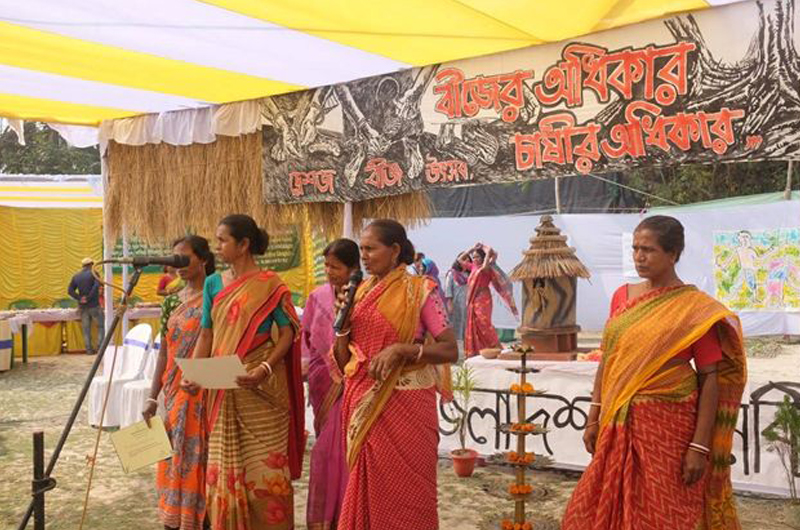
“Indigenous seed preservation is an important strategy to ensure viable alternatives and ecological resilience, especially in the face of climate disaster,” said Sayantoni Datta, co-founder of the Jaladarsha Collective, at the inaugural. She pointed out that when she was working on (Cyclone) Amphan-affected regions, the farmers demanded seeds over momentary disaster relief kits.
Six local agricultural organisations and eight farmers’ groups, of which four were led by women, set up their stalls, exhibiting their preserved indigenous seeds which are salt-tolerant, pest-resistant, and can survive floods which are common in the area. The seeds are sustainable and environment-friendly alternatives to hybrid seeds which not only need excessive water, chemical fertilisers and pesticides but are also unable to cope with the current shifts in climate change.
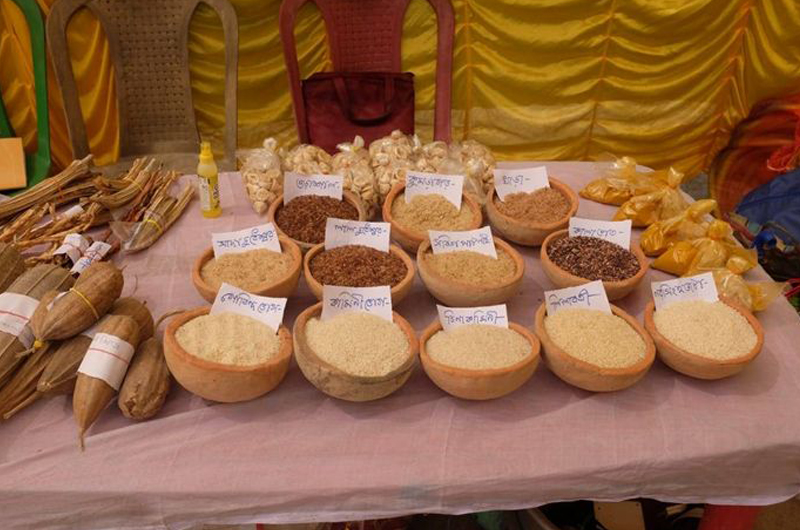
In the panel discussions held, the first focused on the role of women in agriculture with panelists Chandra Mukhopadhyay, a researcher and archivist of women farmers’ oral traditions, and Pompa Koyal, Rowshenara Gazi, and Parveen Khatun, women group leaders and farmers. Some of the prominent issues covered by them included the exploitation of women farm workers, the erosion of women’s traditional, cultural, and ecological knowledge systems in the face of modern commercial farming, and the methods women landless farmers employ to meet the nutritional needs of their families. Chandra Mukhopadhyay highlighted an important issue when she said, “National data still says that 70-80 per cent of all agricultural work is done collectively by women even though they are not recognised.”
The second panel moderated by Chandrani Das discussed climate resilient farming practices in the Sunderbans Region to meet health and livelihood needs. The panelists included Bishnupada Mridha, Tushar Das and Sajal Nayan Baidya. Two focused discussions on the technical aspects of goat rearing and fish farming chaired by Chinmoy Mukherjee and Umapati Sarkar, respectively, saw the enthusiastic participation of the attendees.
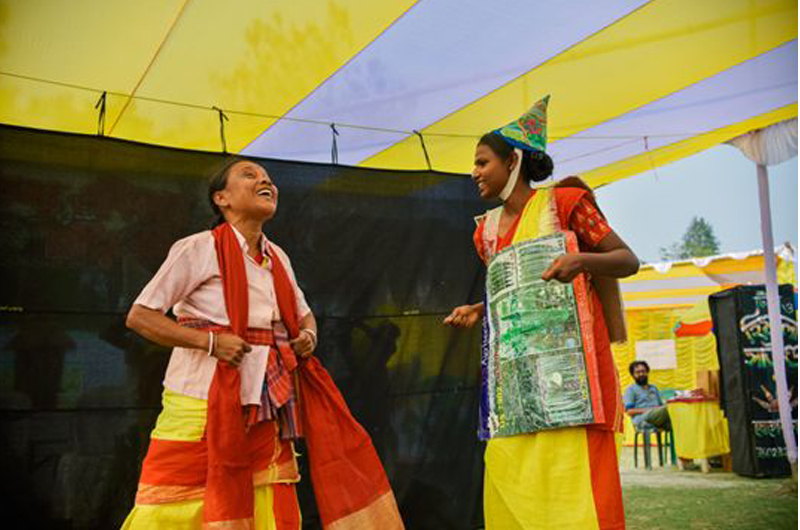
At a suggestion counter set up to document farmers’ demands, several farmers, including women, attending the programme enlisted their demands. Sundarbans, being a disaster-prone region, also sees a lot of migration of labour. Often, women are left to tend to the land. A popular demand was the improvement of drainage and canal irrigation for the Sundarbans, to stabilise agriculture practices. Post-flooding, water stagnates and no systems have been put in place to help drain out water.
Further, while the Sundarbans Development Board attempted rainwater harvesting, the exercise failed due to lack of practical considerations, mentioned Bisnupadha Mridha, one of the panelists. Most small farm holders wanted training in small livestock and pisciculture; the need for medical training and vaccination inputs for small livestock and cattle was another demand. Wider availability of new small-scale farm technologies and farming and more markets where locally grown and harvested products may be sold for a reasonable price were among the other demands.
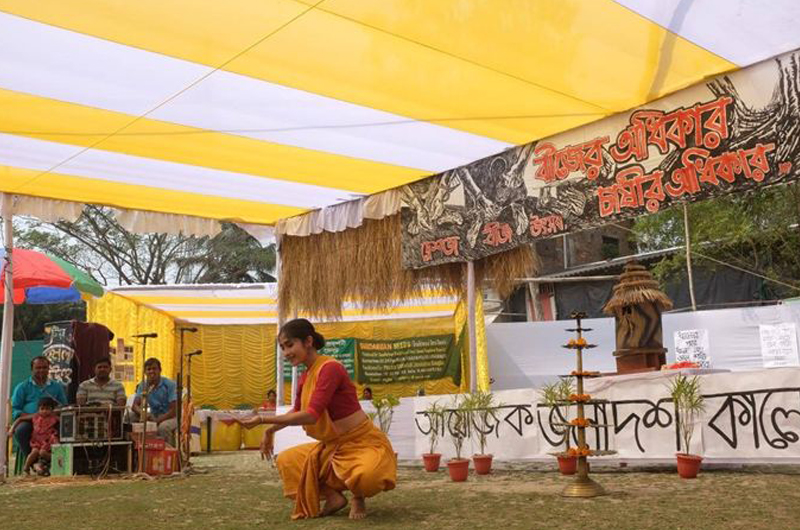
The seven-hour long event commenced with tushugaan, the traditional songs of an Adivasi women’s group called Nona Matir Dol, followed by a dance performance titled Seed Energy by Madhyama Halder. The event concluded with a vibrant theatrical performance titled Unnoyan Kotha by theatre group Janasanskriti Kendra (Digambarpur), which took a critical look at the impacts of the Green Revolution, and corporate control over farming inputs and its role in farmer indebtedness. Along with highlighting the success stories of natural farmers, the festival felicitated women farmers for their notable contribution to natural farming.
(This article is based on a release from the Jaladarsha Collective.)


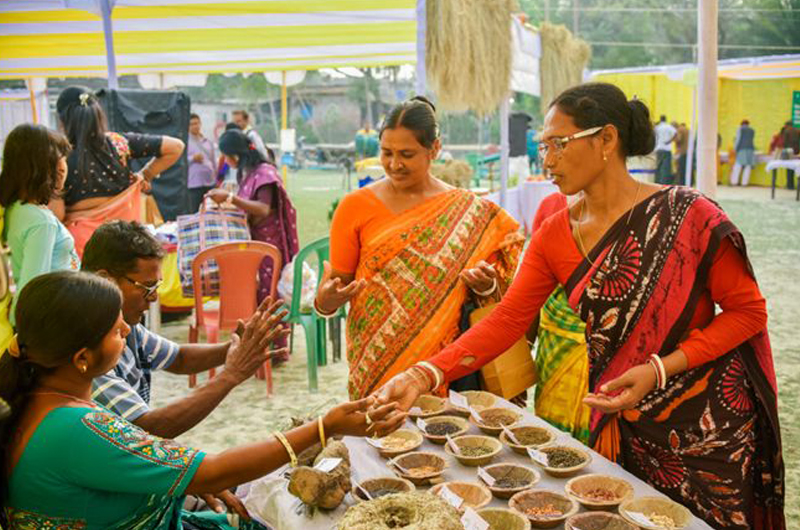
 from Webdoux
from Webdoux